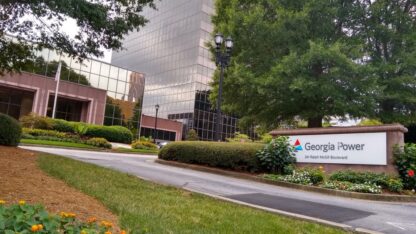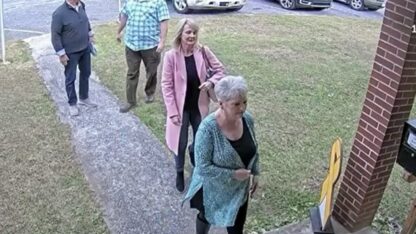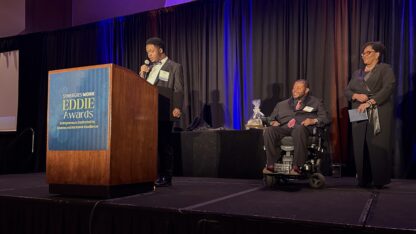Issues To Watch In Georgia’s 2018 Legislative Session

Al Such / WABE
Lawmakers from around the state gathered Monday in Atlanta for the annual, 40-day legislative session. This year’s is the second session of Georgia’s 154th General Assembly.
They’re set to pass a more than $20 billion budget and take up issues ranging from “religious freedom” to rural broadband and health care. It’s also an election year, and because lawmakers can’t campaign during the legislative session, it’ll likely be a shorter session so those running for election can hit the campaign trail.
Here are some of the top issues to watch.
Election-Year Politics
Every two years, elections are held for all of Georgia’s 56 state Senate seats and 180 state House seats. But 2018 looks to be especially fraught with election-year politics.
For the first time in 20 years, the sitting governor and lieutenant governor will not be running for election. Those seats are up for grabs. Four Republican men who serve in the state Senate are running for higher office, including the body’s president, Lt. Gov. Casey Cagle.
Republican House Speaker David Ralston has made clear he does not want political fights to bog down the session.
“If we’re going to take off every other year for people to run for office, then maybe we just ought to not have a session during an election year,” Ralston said. “Rural Georgia for example, there are communities that really can’t wait much longer for jobs, for better schools, for health care access, and I think we’re doing them a disservice if we’re focusing on our personal political agendas.”
Ralston repeatedly noted his apparent frustration with the state Senate for not passing bills that originated in the state House last year. Two state Senate bills backed by that body’s leadership still await approval in the state House.
Typically, state House and state Senate leadership usually agree on when they’ll meet during the first few days of the session, but leading up to this year’s session, they still hadn’t decided whether they should officially gather the day after the College Football Playoff National Championship game featuring the University of Georgia.
“We share the speaker’s concern on the importance of moving this legislation — and appreciate him prioritizing this issue for Georgia families,” said Cagle’s chief of staff Bo Butler. “I have every expectation the Senate will act early to advance an adoption bill. In keeping with our commitment to enhance the lives of children and families, I anticipate the Senate will be in session on Tuesday and working on our shared priorities.”
The Adoption Bill
The bill is intended to modernize the state’s adoption laws. The state House, where the bill originated, passed the measure last year, but it stalled in the state Senate after a provision was added that would allow some private agencies to deny services based on the agency’s religious beliefs. Opponents of the provision said the language would discriminate against LGBTQ families who are looking to adopt.
Gov. Nathan Deal and House Speaker Ralston have called for the bill to pass as a “clean bill” — meaning without “religious freedom” language.
“We lost an opportunity to modernize and expedite our process here in Georgia and get kids out of the foster system and into permanent, stable, loving homes quicker,” Ralston said last week. “I think that’s just so unfortunate.”
The bill is currently in a state Senate committee, after it was sent back to committee on the last day of the Legislature last year.
Rural Development
Rural Georgia is cool again, or at least trying to solve its many problems is.
Separate committees of state House and state Senate lawmakers traveled around Georgia in 2017, holding meetings to discuss how to improve conditions in rural areas.
Between 2007 and 2017, during and after the recession, Atlanta saw a 3 percent increase in population, while rural Georgia saw just .03 percent population growth.
Atlanta lost just a small fraction of jobs during that period, but rural Georgia lost nearly 7 percent of its jobs.
In December, the House Rural Development Council released its recommendations for changes to policies around health care, economic growth, education and telecommunications.
Many of those recommendations are set to become legislation with the backing of top Republicans in the state House.
The suggestions range from expanding internet access in rural areas to a potential tax break totaling $100,000 over 10 years for people who move to rural counties.
Health Care
State lawmakers have also been spending the past year looking at the state’s health care challenges. That includes struggling rural hospitals, the opioid epidemic and the number of people who are uninsured in the state.
A state Senate study committee on “Barriers to Georgians’ Access to Adequate Healthcare,” for one, has recommended legislation intended to attract more nurses to move to rural parts of the state. Under current state law, advanced nurse practitioners (APRNs) are limited in what they can or can’t do in their practice. For example, they must have physician oversight to prescribe medication or order certain tests. The recommended proposal would allow advanced nurse practitioners a wider medical authority if they practice in certain rural counties.
Some lawmakers have also been talking about “Medicaid waivers” to access more federal health care dollars. Georgia is one of 18 states that did not expand Medicaid under the Affordable Care Act. A waiver would allow states to use the money for state-specific programs. State Sen. Renee Unterman, R-Buford, has expressed interest in using Medicaid waivers for helping cover “targeted populations,” like those who have substance abuse or behavioral health issues.
Confederate Monuments
Violence in Charlottesville, Virginia, last year over a plan to remove a statue of Robert E. Lee renewed the conversation in Georgia about the fate of Stone Mountain and the many other memorials to Confederate icons around the state.
State law says it’s illegal to “mutilate, deface, defile, abuse contemptuously, relocate, remove, conceal or obscure” Confederate monuments. Democratic state Sen. Elena Parent and Democratic state Rep. Mary Margaret Oliver have already filed bills that would give local governments control over the fate of these monuments.
However, Ralston said control of the monuments should be left to the state, effectively sealing the fate of those Democratic bills before the session even begins.
In the summer of 2017, a statue of Martin Luther King Jr. went up on the grounds of the Georgia State Capitol, which remains dominated by memorials to Georgia politicians who were segregationists.
Mass Transit
The House Commission on Transit Governance and Funding, which was created last year, has been looking into the issue of regional transportation.
The topic of mass transit has been gaining momentum as the state continues to grow and is looking to attract businesses. Amazon, for example, has said it’s looking to build its second headquarters in a place that has access to mass transit.
The House commission has yet to release its recommendations but will continue to look at the issue through the end of this year.
Unlikely To Pass
Proposals that would expand legal protections for individuals and religious entities will likely be filed, but Deal and Ralston have indicated they’re not likely to support those measures.
“Religious freedom” bills have drawn loud and harsh responses from LGBT advocates and corporations alike over concerns they would lead to discrimination.
Deal vetoed a “religious freedom” bill in 2016.
Four of the major Republican candidates for governor signed a pledge that if a state version of the federal Religious Freedom Restoration Act got to their desk as governor, they would approve the measure. Two of those Republican candidates serve in the Senate.
Also unlikely to pass, any legislation enabling casinos to set up in Georgia. For the past few years, major casinos have tried to entice Georgia lawmakers to legalize casino gambling, but to no avail.
Leaders throughout the Legislature have said they’re not interested.








